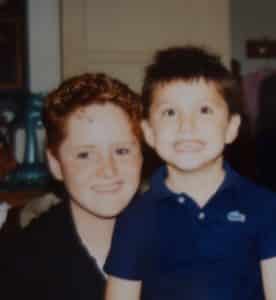
No one ever asked me how I felt about not having a father. I just didn’t have one. I understood it, as if a father was an incidental like a car, a pet, a sibling or a bike. You either have one or you don’t. Did I miss him? Did I want him? I had absolutely no idea who he was, where he was, or that I was “supposed” to have one. It did not hit me that I wanted a father until I was a teenager. I knew I looked different than my brothers, I knew that my glow-in-the-dark white skin and freckled face was different. It mostly came from my rage with my mother and the trauma I endured that I momentarily wanted a father. I imagined that he would have protected me, provided stability, and loved me. The moment was fleeting, though. I imagine at the time I did not have the internal strength to grieve what I did not have.
At about the same time, 14 years old, I learned that not all fathers stay and parent their children, this is true for mothers as well. I was convinced that if my father had seen me, held me for just a moment that the bond would have made it impossible for him to leave me. If only, I thought.
It wasn’t true. I soon witnessed my friends have children with the hope and the promise of creating a family. Yes, they were young teenage mothers, but nonetheless they craved a family of their own. The absence of my father seemed less distressing to me as I witnessed the longing and the promises un-kept by the fathers of these children. To me, this was a more painful reality.
One particular boy carried the greatest burden. His father came and went with less predictability than winning a raffle. The phone calls came months apart, but he was always ready. He wanted to look like his dad, so he dressed his 5-year-old body with a white t-shirt, jeans and boots. He waited patiently on the couch afraid to move and miss his father. Seeing his distress, I tried to coax him away from the “waiting” and play a game with him—but he was too focused and eager to move. The anticipated time came and went. Still he did not move. His young body, giving in to the suspense, nodded off into a light sleep, as he waited to hear the roar of his father’s car. When he came, he made an entrance, his chest puffed out, his arms contracted as if to show his biceps as he shook his hair and preened. He showed no remorse, no accountability for the disappointment and false promises. He was here now, and we should all be grateful and admire his effort.
This boy’s face grew bitter and hard. It was as if he knew more than he should at 6 and 7. And he did. The same scenario repeated time and time again; only this time the months grew into years and the infrequency of contact took its toll. He felt unloved, unwanted and abandoned. No attempt from anyone else to lift his spirits and fill that gaping hole would suffice. Any effort to reconnect over the years of adolescence was marred by his father returning him home to his grandparents. The father would not tolerate any questions about his absence; any challenge to his choices was met with fury. There was no room for the boy to understand. His questions squelched by insecurity, his curiosity doused with spit from the anger of his father. Where was he to go with his questions, his need to understand why he was abandoned? Where else could he become vulnerable, if not with his parent? There was no compassion for this child.
He was left to fend for himself, to make sense of his life, to patch together what he knew to become a man. He pieced together and stitched a semblance of his life, but the seam continually ripped and repair often went neglected. There were tears and holes visible to the attentive person. The wounds festered under the guise of a young man, the hurt covered with sarcasm. Finally, his defenselessness yielded to violence.
When does it end? I say we must challenge those who have failed us, interrogate the parent, shift the guilt and shame to where it belongs and let them carry what is theirs.
.

